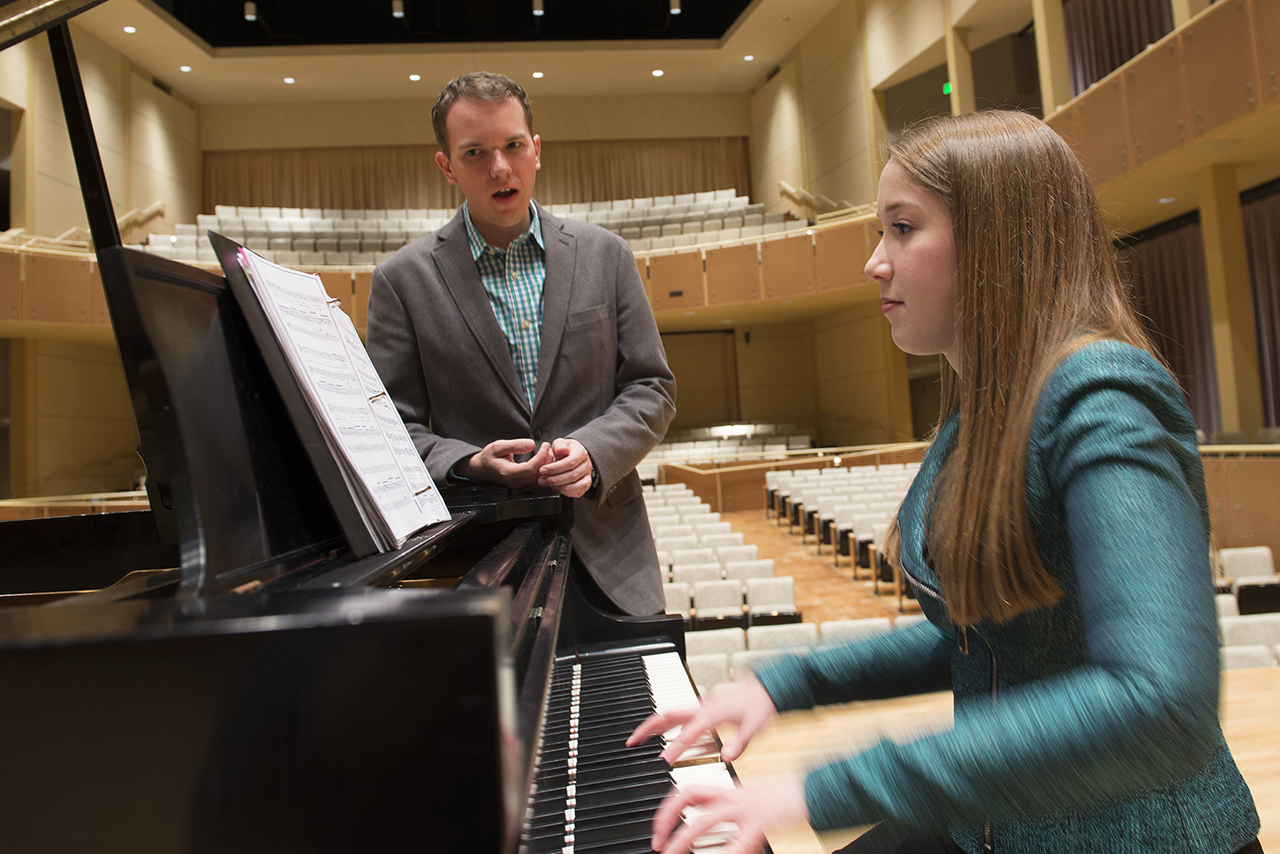Not many high school students know they want to be an opera coach. Lauren Koszyk did, and she found out she could become one at Illinois State.
“I’ve created my own path at ISU; I don’t know of any other opera coaches here,” Koszyk, a senior, said. “I knew I’d have flexibility here, and a great opportunity to work with talented faculty like John Koch. I knew I’d get the training I needed and be able to focus on my passion.”
In December she will graduate with degrees in piano performance and German, with plans to pursue her doctorate in collaborative piano. After starting piano lessons at 10, Koszyk was accompanying other students by junior high, and had already fallen in love with opera.
Now the Bone Scholar is working with world-class singers as an opera coach with the Midwest Institute of Opera (MIO) under the College of Fine Arts. In its sixth year, MIO was founded by Koch, a School of Music associate professor, and Tracy Marie Koch ’01, a soprano and voice teacher. Both seasoned opera professionals, the husband and wife team saw a real need for a program that helps young singers hone their skills.
The institute gives emerging professional musicians from as far as Australia and Israel an opportunity to perform operatic roles in their original language under the guidance of professional opera staff. The intense summer program draws about 40 performers.
This year’s season begins July 25 and includes public performances of Falstaff sung in Italian, Dialogues of the Carmelites and Hansel and Gretel, both sung in English. Koszyk will be performing and coaching in Dialogues of the Carmelites.
John Koch has listened to her skills develop as she has played for well-known operas in the University’s Center for the Performing Arts. Since there is no orchestra at the MIO performances, the operas are mainly performed with piano accompaniment.
“Lauren is getting more comfortable with the Romance languages used in opera and art song, and she is learning the performing styles of the last few hundred years of music history,” he said. “She is learning how to adapt an orchestral reduction piano vocal score into a fully supportive and musical piano accompaniment.”
There is a big difference between a voice teacher and an opera coach. A voice teacher focuses on technique and mechanics; a coach knows the language, composer, and history of the opera. Coaches are often pianists who have been trained in diction, repertoire, collaborative piano and opera.
“The coach helps with the musical interpretation of the piece,” Koszyk said. “They work with the singer to find their voice and bring that to the conductor and the orchestra.”
Beethoven’s not easy

Opera coach Lauren Koszyk works with singer Landon Westerfield in the Center for the Performing Arts.
On a summer afternoon in the Center for the Performing Arts, Koszyk was coaching Landon Westerfield, M.M. ’16, who studied performance and conducting at Illinois State. He was preparing for his first international performance, in Canada, where he will sing arias in German, something with which he wasn’t quite comfortable. Only a couple of minutes into Ludwig van Beethoven’s An die ferne Geliebte, his coach stopped him, correcting his pronunciation.
“Zee?” Westerfield asked.
“Zay,” Koszyk said.
And then she asked him to bring out more emotion, to feel Beethoven’s pain and longing from the separation of the woman he loved.
“More realization,” she said. “If you feel it inside, it comes through.”
“Beethoven just doesn’t make it easy,” he said, laughing.
The two have been working together for more than a year. Each practices about six hours a day. Westerfield appreciates her skills, as well as the opportunity to rehearse in an empty concert hall.
“I can either fail here or in front of an orchestra,” he said. “We work together a lot, and she’s very honest.”
He asked for her advice on timing, and then began an aria.
“I was late, wasn’t I?” he asked, beginning again.
Koszyk returned to a familiar place on the page.
“You become part of the music,” she said. “I’ve loved music all my life. What I think is so fascinating about opera is it’s a synthesis of music, art, drama, dance. I love literature, the visual arts, and drama, and opera brings that all together.”
She knows where she’d like to ultimately perform.
“I’d love to be at the Met or the Vienna State Opera working with world-class singers. I’ve been to Vienna, and it felt like home.”
Kate Arthur can be reached at kaarthu@IllinoisState.edu.

